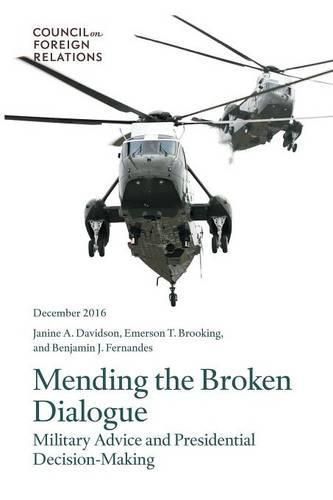Readings Newsletter
Become a Readings Member to make your shopping experience even easier.
Sign in or sign up for free!
You’re not far away from qualifying for FREE standard shipping within Australia
You’ve qualified for FREE standard shipping within Australia
The cart is loading…






As commander in chief of the armed forces, the president of the United States bears great responsibility in determining when and how to use military force. To make such decisions, the president requires clear understanding of the risks, costs, and likely outcome of a military intervention. Because many presidents and senior civilian appointees lack military experience, they rely on senior military advisors to provide viable, realistic, and timely advice to inform critical decisions. Unfortunately, what the military leadership provides is often not what presidents are looking for.
Whereas civilians expect a collaborative dialogue in which multiple options are presented to them over a short period of time, military officers are taught to deliver their best military advice only after developing a detailed plan. Developing such a plan takes longer than civilians anticipate, and this process can be stymied when presidents and their advisors are unable to provide the sort of detailed guidance that the military expects. Meanwhile, the president cannot determine the best guidance without first understanding the costs, risks, and benefits of each potential option. This chicken-and-egg dilemma is a perennial feature of civil-military decision-making.
Although friction often frustrates civil-military relations, it is an inevitable and important part of the policymaking process. The system breaks down when there is too much friction or too little: when civilian and military leaders descend into open conflict or when one side acquiesces to the other and embraces groupthink. The system works best when both sides in the civil-military dialogue are able to speak candidly in an environment that fosters empathy and empowerment.
$9.00 standard shipping within Australia
FREE standard shipping within Australia for orders over $100.00
Express & International shipping calculated at checkout
Stock availability can be subject to change without notice. We recommend calling the shop or contacting our online team to check availability of low stock items. Please see our Shopping Online page for more details.
As commander in chief of the armed forces, the president of the United States bears great responsibility in determining when and how to use military force. To make such decisions, the president requires clear understanding of the risks, costs, and likely outcome of a military intervention. Because many presidents and senior civilian appointees lack military experience, they rely on senior military advisors to provide viable, realistic, and timely advice to inform critical decisions. Unfortunately, what the military leadership provides is often not what presidents are looking for.
Whereas civilians expect a collaborative dialogue in which multiple options are presented to them over a short period of time, military officers are taught to deliver their best military advice only after developing a detailed plan. Developing such a plan takes longer than civilians anticipate, and this process can be stymied when presidents and their advisors are unable to provide the sort of detailed guidance that the military expects. Meanwhile, the president cannot determine the best guidance without first understanding the costs, risks, and benefits of each potential option. This chicken-and-egg dilemma is a perennial feature of civil-military decision-making.
Although friction often frustrates civil-military relations, it is an inevitable and important part of the policymaking process. The system breaks down when there is too much friction or too little: when civilian and military leaders descend into open conflict or when one side acquiesces to the other and embraces groupthink. The system works best when both sides in the civil-military dialogue are able to speak candidly in an environment that fosters empathy and empowerment.